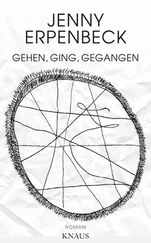Jenny Erpenbeck - The End of Days
Здесь есть возможность читать онлайн «Jenny Erpenbeck - The End of Days» весь текст электронной книги совершенно бесплатно (целиком полную версию без сокращений). В некоторых случаях можно слушать аудио, скачать через торрент в формате fb2 и присутствует краткое содержание. Год выпуска: 2014, Издательство: New Directions Publishing, Жанр: Современная проза, на английском языке. Описание произведения, (предисловие) а так же отзывы посетителей доступны на портале библиотеки ЛибКат.
- Название:The End of Days
- Автор:
- Издательство:New Directions Publishing
- Жанр:
- Год:2014
- ISBN:нет данных
- Рейтинг книги:4 / 5. Голосов: 1
-
Избранное:Добавить в избранное
- Отзывы:
-
Ваша оценка:
- 80
- 1
- 2
- 3
- 4
- 5
The End of Days: краткое содержание, описание и аннотация
Предлагаем к чтению аннотацию, описание, краткое содержание или предисловие (зависит от того, что написал сам автор книги «The End of Days»). Если вы не нашли необходимую информацию о книге — напишите в комментариях, мы постараемся отыскать её.
The End of Days — читать онлайн бесплатно полную книгу (весь текст) целиком
Ниже представлен текст книги, разбитый по страницам. Система сохранения места последней прочитанной страницы, позволяет с удобством читать онлайн бесплатно книгу «The End of Days», без необходимости каждый раз заново искать на чём Вы остановились. Поставьте закладку, и сможете в любой момент перейти на страницу, на которой закончили чтение.
Интервал:
Закладка:
When evening comes, the old woman sets aside her book, putting on her apron again. If there is meat, she begins her cooking by going down to the courtyard and cleaning her sharp knife by thrusting it into the ground, then pulling it out again, because in this household you can’t count on anyone but her to respect the prescribed separation of dishes and implements. The kid may not be cooked in its mother’s milk, that’s all there is to it.
15
On Ellis Island, a tiny bit of land within eyeshot of Manhattan, the new arrivals are inspected to determine their suitability for a life of freedom. Their eyes are checked, their lungs, their throats, their hands, and finally their entire exposed bodies, men and women separately, children separately from their parents.
When they check your eyes, watch out for the man with the hook!
Why?
When he comes to check you, he can make your eye fall out.
No way.
It’s true, a man told me about it, he said his eye fell right into his jacket pocket.
When it’s his turn, he’s brought into the examination room and told to undress completely. He doesn’t understand the instructions in English, but even after an interpreter translates them for him, he doesn’t move. Have the Americans lost their minds? Or do they really think of it as a second birth when you set foot in their country? In any case, his examinations at the Technical University in Vienna — which certainly weren’t easy — had gone differently.
Come on, they say, meaning: Hurry up.
There’s no help for it: More naked than he ever stood before his wife, he must now, like it or not, stand here in the light and present himself to an entire group of doctors. If only you could know in advance where the path you choose freely will lead. His coat and clothing are meanwhile being disinfected, when he gets them back after the examination they are crumpled. Shame, then, is the price one pays for this life of freedom, or is this itself the freedom: that shame no longer matters? Then America really must be Paradise.
16
Her husband has known for a year and a half what comes after death, and soon she will, too. Her daughter, on the other hand — although she’s been a widow longer — has a good part of her path still before her. Keeping the shop is a struggle. What will become of her granddaughter when she is all alone in the world someday?
Two ships lie in the harbor. She holds her ears with their sagging lobes close to her husband’s mouth — his whisper is so soft, she can scarcely hear the rest of the story, but she herself has read it often. One of the two ships has just returned from a long voyage, the other is just preparing for a long voyage. She tries to give her husband — for whom speaking is an exertion — something to drink, but he refuses to swallow, and so the water runs down his stubbly chin onto the pillow.
Jubilation and blessings accompany the ship as it sails off — while the arriving ship goes unremarked. But is it not this ship that deserves jubilation?
What a shame that she was able to raise only the one daughter with him. Two other children died shortly after birth. When on some evenings she wept over the ones that had died, he would sit down beside her with a nod.
The newly arrived ship lies safely in the harbor. But nothing is known of the one just setting sail. What will be its fate? Who knows whether it will successfully withstand the storms awaiting it?
Her daughter recently remarked that perhaps it would make more sense to close the store and rent out part of the apartment instead.
Or would you rather have some soup? she asks him.
The pillow is still damp with the water she tried to give him when he stops being able to breathe.
17
The shopkeeper can still clearly remember the day the goy first came into the shop and saw her daughter, who had just turned sixteen. Since he displayed serious interest, she summoned him not long afterward to have tea with her in their apartment while the girl was at school. She showed him the living room and the bookcase with Goethe’s Collected Works , spoke of the dowry, and finally even brought him into her daughter’s room, where the dress the girl had worn the day before was still draped over the back of the big armchair, one of the shoes beside it had fallen over, and the housecat lay curled up on the bed, asleep.
I’m sure you realize we are of Jewish descent.
Yes, I know.
There’s still time for you to turn back.
She had sold many a bit of merchandise in her life. She knew when it was too late for a customer to walk away from the deal. The more freedom you gave him to choose, the more likely he was to choose exactly what he was supposed to.
What are you saying?
For a while both of them remained standing beside the bed of the absent girl, looking at the cat, which, from time to time, extended its claws in a dream and then pulled them back in again beneath the fur.
That morning, for the sake of her daughter’s happiness, she had sold her daughter’s happiness. Sometimes the price one pays for something continues to grow after the fact, becoming too expensive long after it has been paid. A transaction like this is a living equilibrium, she’s grasped this in the course of the three years since her son-in-law’s disappearance. Profit and loss must avail themselves of a salesman if they are to work together, but fundamentally their dealings are with one another; at some point they balance each other out again. In the sunlit silence of a Sabbath, a letter falls from an opening hand into a hand that someone is holding out. A man wanting to deliver a letter on Shabbat is not permitted to, according to the Talmud, because that would be work. It would be work to walk from the street into a building, in other words mixing indoors and outdoors. On Shabbat people are to rest, and the three spaces — Outside, Inside, Wilderness — are to be kept separate from each other. But if the messenger walks up to the recipient’s window opening onto the street and lets the letter fall into the recipient’s hand, the messenger would not be leaving his space — the street — and the recipient would be remaining in his own — the building; what’s more, the dropping of the letter would not be a giving, nor would its receipt in the open hand be a taking. How heatedly she and her husband had debated with her parents about how the Talmud pointed the way here to deceit, to the violation of the rules that were supposed to be its jurisdiction. Her father said it was a matter of how the boundaries were defined, that it wasn’t possible to comply with a prohibition unless you knew exactly where it started and ended. In any case, it wasn’t a parable, her husband had said, but rather in the end pure mathematics. Her mother had laughed and opined: thank goodness it was a letter the messenger was dropping and not an egg. She herself had declared the messenger’s hesitation pedantic, making her father smile at her indignation, saying: you don’t understand what’s meant. At the time she didn’t want to understand what was meant, her father was still alive, and as long as that was the case she — even as a grown woman — was the one permitted to be in error. In the sunlit silence of a Sabbath, a letter falls from an opening hand into a hand that someone is holding out.
How happy a person must be, she’s come to think — now that twenty years have passed since her husband’s fatal beating, three since her daughter’s abandonment, one and a half since her father’s death and burial — how happy a person must be who can manage to comport himself as impassively as the messenger in this story, simply letting things happen as they will and nonetheless delivering what has been entrusted to him. When in her home she finds traces of dirt on a knife that her elderly mother has cleaned, she feels only disgust. Her daughter, on the other hand, moves so lethargically about the shop that she often feels an impulse to drag her by the hair back to work. But she observes even her own body with impatience as it struggles to hoist the ten-kilogram sacks of flour onto the cart, and the farmers who sometimes help her and sometimes don’t are called Marek, Krzystof, or often — hearing the name is still difficult for her — Andrei.
Читать дальшеИнтервал:
Закладка:
Похожие книги на «The End of Days»
Представляем Вашему вниманию похожие книги на «The End of Days» списком для выбора. Мы отобрали схожую по названию и смыслу литературу в надежде предоставить читателям больше вариантов отыскать новые, интересные, ещё непрочитанные произведения.
Обсуждение, отзывы о книге «The End of Days» и просто собственные мнения читателей. Оставьте ваши комментарии, напишите, что Вы думаете о произведении, его смысле или главных героях. Укажите что конкретно понравилось, а что нет, и почему Вы так считаете.












